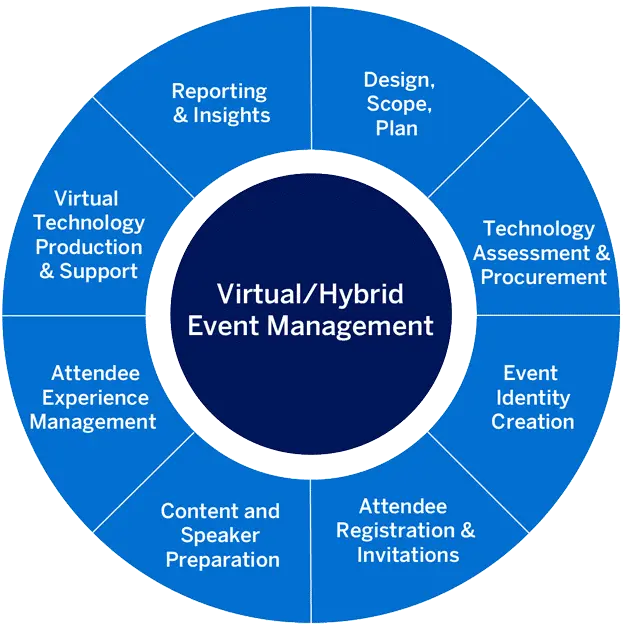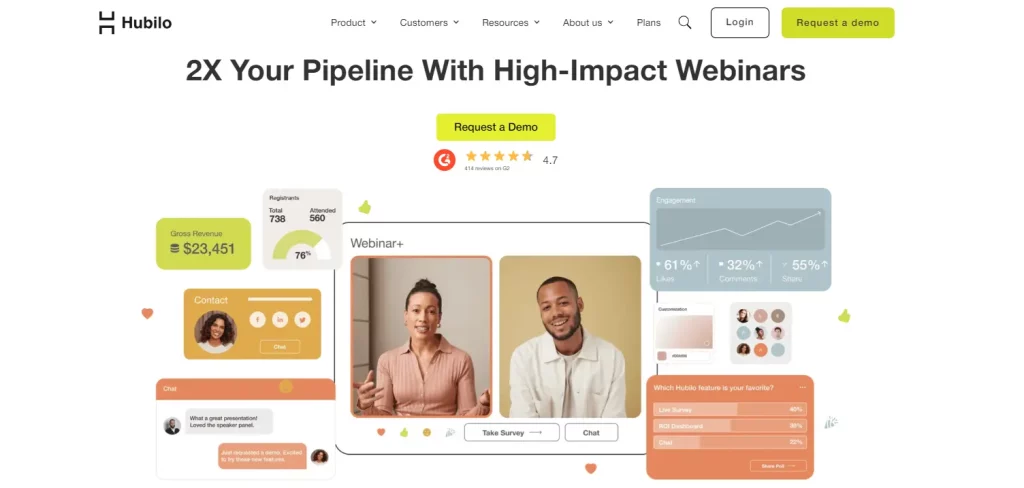Virtual events are the epitome of digitalization and transformation in the event industry. During the Pandemic, when businesses were striving to survive, online events brought redemption. Many caught the trend as economic salvation, which helped them transcend physical boundaries. In 2020, the share of virtual marketing events was 35%, which went up to 40% in 2022.
Now, the world is back to normal after the pandemic, and hybrid events are getting more attention. But this doesn’t mean that virtual events are going behind the curtain. In fact, the online events market is expected to touch the 36 billion USD mark by 2027.
In this article, you’ll learn the virtual event meaning and get to know about the best online event platforms. Furthermore, we’ll discuss popular virtual event types and the best online event practices.
What is a virtual event?
A virtual event is actually an event where people connect, interact, or cooperate online. In its essence, a virtual event means using digital environments or platforms to discuss business or spread awareness. The purpose of an online event is to mitigate communication problems such as physical distance in order to facilitate networking.
Benefits of Virtual Events
Online events are beneficial for large enterprises with a global audience and small businesses with fewer resources. Below are some instant and long-term benefits of virtual events that your business can reap.
- Connect you with a large, global audience
- Save time and reduce budget
- Strengthen one-to-one communication
- Improve motivation and spread of information
- Help manage multiple sessions at once
- Provide insights and measurable results
- Build brand recognition and thought leadership
However, the key to holding a successful virtual event is managing it professionally. So, learn how virtual events work and how you can manage them with minimum effort.
How do virtual events work?
The simple answer is that virtual or online events involve the use of the latest technology stack. To hold a virtual event, you’ll need:
- Internet connectivity
- Suitable devices (Laptop, PC, tablet, or smartphone)
- Appropriate virtual event platform (software)
- Webcam or camera
- microphone
Like live event production, virtual events require effective planning, and you cannot go blindly. You should pick a theme considering your audience and the topic for the event. Also, pay attention to technical aspects and choose a virtual events platform which your target audience can easily use.

Popular Types of Virtual Events
Virtual events can be divided into different categories based on their type and people’s interests. Below are the types of virtual events that are more popular among attendees and businesses.
- Online Music Concerts
- Virtual Job Fairs
- Online Conferences
- Virtual University Fairs
- Webinars and workshops
Best Virtual Event Platforms
Now that you are aware of virtual events and their benefits let’s discuss online event platforms. Virtual events hosting isn’t rocket science, but it does require familiarity with the best virtual event platforms.
What is a virtual event platform?
A virtual event platform is actually a software or tool which users utilise to hold the event digitally. In simple words, it’s your event venue in the online world. An online event platform helps in all aspects, from planning to managing to promoting your webinars, online workshops, and virtual conferences.
In case you are wondering whether virtual events hosting is the same as Zoom meetings, the answer is no. Online event platforms are different from video conferencing software, such as Skype or Google Meet.
vFairs – Best Online Events Platform Right Now
Founded in 2016, vFiars has quickly become an ideal choice for hybrid and virtual events production, considering its unique features. The platform is widely recognised for its customisation, user-friendly interface, gamification feature, and empathetic customer support. It offers what matters the most for any business, i.e., networking and the business environment
What makes vFairs stand out is its breakout rooms and live chat option. The virtual event platform allows your participants to participate in group chats or communicate privately.
Airmeet – Virtual Platform for Businesses and Brands
One of the most popular online event platforms right now is Airmeet. It’s often compared with Zoom, but the former beats the latter in terms of features and quality. Airmeet leads the market when it comes to offering HD visuals and superior sound quality during virtual events. Additionally, the platform provides an immersive experience through its “Social Lounge”, where attendees can start their own sessions.
However, our prime reason for choosing it is its scalability and ease of use. Online event organisers can increase the number of participants and add up to 16 speakers at once. That’s way too many for an online event, but having more is always good, right?
Remo – An Interactive Virtual Events Hosting Platform
If you are a fundraiser or someone who frequently hosts charity events, Remo is the perfect fit for you. The virtual event hosting platform comes loaded with networking features, including presentations.
What we liked the most about Remo is its creative hosting feature. The platform showcases a virtual floor plan with multiple tables where attendees can sit. A single table accommodates 4 or 8 persons, and you get to view other members when you take the seat. The good thing is that you can chat with other members present at your table or any other table.

Vemo enables you to share presentations with attendees and network through virtual business cards. And you can invite up to 50 persons to your virtual event or online charity function.
Webex Events – All-In-One Online Event Platform
Webex Events (formerly Socio) is another interactive virtual event hosting platform that benefits brands and businesses equally. The software allows event organisers to add multiple speakers at once, ensuring healthy, fruitful conversations. What’s more intriguing is that the platform has a unique mobile event app which you can use for Androids and iPhones.
We also loved the “Production Studio” feature that Webex Events is offering to organisers and participants. It allows you to live stream the event as it happens without requiring prior adjustments to visual or sound quality.
Hubilo – Virtual Events Hosting Software for Webinars

If you ask us to name the top 3 online event platforms for webinars, Hubilo will be our first pick. It’s arguably the best virtual events hosting, which ticks all the boxes, including a superb customer service experience. You will be amazed by its data-driven insights and reporting that you can take a look at before, during, and after the event.
Hubilo has earned a good name in the market for offering the best ROI in terms of customer satisfaction and usability. No wonder it’s trusted by big marketing giants such as Deloitte and Coca-Cola.
How to Host a Virtual Event – 7 Best Practices
It is daunting to plan an event online if you are going to host it on a virtual platform. If you are new to virtual events, we have a concise guide for you to cover the basics. The below tips can help you organise your online event effectively without breaking a sweat.
Set SMART Goals
Organisers have to think quickly and act promptly during events, especially if they are hosting online. This is where you’ll have to set SMART (specific, measurable, achievable, relevant, and time-bound) goals. So, define what you want to achieve, whether it’s lead generation or brand awareness.
Of course, the goals will change with respect to the organisational goals and business needs.
But you must ensure your participants don’t get bored during the online event. To avoid this, you can divide your virtual event goals into participants’ and speakers’ goals.
Identify Your Audience
Setting goals for a virtual event is easy if you know your audience type. That’s why event industry experts urge businesses to do market research and pay attention to what their audience needs. It’s a wise decision to invest in equipment which might entice them or intrigue their interest.
For example, if you are doing a product launch through a virtual event, focus on staging and set design. Additionally, pay attention to illuminations and hire quality lighting for events. And only invest in superior IT equipment rentals for your event.
Choose the Right Time & Platform
Timing is everything in the event industry, especially when you are releasing a new product or introducing services. The only thing that matters the most during an online event is the virtual platform. An ideal virtual event platform supports your event goals while meeting essential requirements and necessities.
For instance, if you are hosting a fundraising event online, you’d want more people to join. A platform that supports live-streaming and social media sharing would be the ideal solution here.
Invite Guests and Moderators
For Virtual events such as webinars, you’ll need an online event hosting platform that can add multiple speakers. On the other hand, for an online job fair, you’ll need a platform that can support more attendees. So, we recommend you pick a platform which can cater to your specific virtual event needs.
However, your presenters or speakers will need consistent web streaming to ensure smooth transmission of information. And if the participants are from non-English countries, hire interpretation services to cover multiple languages.
Focus on Virtual Event Marketing
Virtual events require a proactive approach to marketing as these are being hosted online. To ensure strong participation, you should start registration early, weeks if not months beforehand. Most businesses run online paid advertisements and social media campaigns to market their online events. However, the choice of marketing tactics depends on the type of virtual event you are trying to host.
For example, for a product or service launch virtual event, you’ll have to focus on awareness. On the other hand, for a business conference or webinar, you’ll have to urge participants to register.
What’s good about virtual events is that you can always share them with your audience on demand. All you need is seasoned content creation services with the right technical skills. You can share the whole event or its sessions on platforms like YouTube. Some prefer sharing short-form visual content to entice their audience and urge them to view recorded sessions.
Don’t Forget Post-Event Follow-Up
A key metric of virtual events is measuring the ROI of your online event in terms of attendance and participation. This is where a good virtual event platform will come in handy and help you measure KPIs. You can quantify the metrics and calculate success rates based on the goals that you’ve set for your virtual event.
Virtual event platforms can provide insights about the number of total participants or leads generated during the event. Furthermore, you can evaluate the user journey throughout the event to assess the success of different sessions.
Virtual Event Examples
MarTech Alliance
One of the best virtual event examples is perhaps the “MarTechfest Dial-Up,” a B2B marketing event. The annual online event typically runs for 30 days, during which 30 different marketers talk about various topics. The company entices people to participate and rewards them based on their participation during the event. To engage new participants, it provides the contents of recently ended events on demand.
Great American 5000
There’s no better example than “Great American 5000” to explain how virtual events can transform our lives. Supported by Sports Backers, the event was held to urge people to participate in a virtual run. Participants were to follow a virtual map after registering online and run between San Francisco and New York.
Needless to say, the event was a big success as people travelled the 5,000km track in groups. The event allows people from different walks to connect virtually while participating in a fun activity.
Pause Fest 2021
Another example of a virtual event is the Pause Fest, which touched almost every major industry in 2021. The virtual event lasted about two weeks, during which more than 76 sessions, talks, and workshops were held. Participants discussed hot topics online, ranging from creativity and branding to businesses and technology.
Final Note
Virtual events are becoming a thing, and as the trend catches on, more businesses are jumping on the bandwagon. An online event allows the brand to connect with its audience on a global scale without investing much in infrastructure. If you are new to the online event trend, EMS Events can help you.
EMS Events is a London-based event production company that specialises in hosting corporate events. We’ve been helping businesses since 1997 and have produced more than 20,000 events so far. Contact us for customised virtual and in-person event production services per your business needs.
Frequently Asked Questions about Virtual Events
Why do virtual events?
Virtual events provide better networking opportunities and allow you to connect with the right audience. Businesses do virtual events to create brand awareness and engage their targeted audiences. This allows brands to address a global audience without spending much on advertisements.
How to host a virtual event the best way?
Below are the best practices for hosting a virtual event.
- Set clear event goals
- Choose the right virtual event platform
- Promote your upcoming event boldly
- Gamify your virtual event
- Host live webinars
- Share post-event analytics & surveys
- Upload keynotes and evergreen content
Why do people attend virtual events?
People attend virtual events based on their interests, but the main reason is convenience. It’s easy to attend an online event because you don’t have to move physically. Virtual events save time and travel costs and can be attended without prior preparation.
